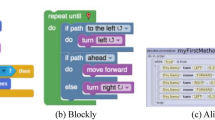Abstract
Computer programming was introduced to primary schools by many countries with the aim of advancing logic and algorithmic thinking of students. The bulk of a typical syllabus (e.g., in the case of Greece) for computer programming courses at 5th and 6th grade primary school, consists of teaching structured programming concepts. While the comprehension of basic program flow concepts such as branch instructions and loops is of paramount importance, overextending the teaching of the basics may lead to students losing their interest due to lack of challenge. On the other hand, in a mixed classroom environment there exist both students with substantial skills in modern computer technology and others with smaller such experience, e.g., due to societal and economic factors. To avoid discouraging both the talented pupils by re-visiting the same topics and the less experienced ones by not providing an alternative way of learning, we investigate instructing advanced computer programming concepts in a playful way using pair programming. Results reveal that teaching advanced programming concepts using pair programming can improve the overall programming skills of mixed classroom students.
Access this chapter
Tax calculation will be finalised at checkout
Purchases are for personal use only
Similar content being viewed by others
References
Wilson, A., Moffat, D.C.: Evaluating scratch to introduce younger schoolchildren to programming. In: PPIG, p. 7, September 2010
Hubwieser, P., Armoni, M., Giannakos, M.N., Mittermeir, R.T.: Perspectives and visions of computer science education in primary and secondary (K-12) schools. ACM Trans. Comput. Educ. (TOCE) 14(2), 7 (2014)
Smith, N., Sutcliffe, C., Sandvik, L.: Code club: bringing programming to UK primary schools through scratch. In: Proceedings of the 45th ACM Technical Symposium on Computer Science Education, pp. 517–522. ACM, March 2014
Funke, A., Geldreich, K., Hubwieser, P.: Analysis of scratch projects of an introductory programming course for primary school students. In: 2017 IEEE Global Engineering Education Conference (EDUCON), pp. 1229–1236. IEEE, April 2017
Sáez-López, J.M., Román-González, M., Vázquez-Cano, E.: Visual programming languages integrated across the curriculum in elementary school: a two year case study using “Scratch” in five schools. Comput. Educ. 97, 129–141 (2016)
Johnson, L., Becker, S.A., Estrada, V., Freeman, A.: NMC horizon report: 2014 K, pp. 1–52. The New Media Consortium (2014)
Grover, S., Pea, R.: Computational thinking in K–12: a review of the state of the field. Educ. Res. 42(1), 38–43 (2013)
Kafai, Y.B., Burke, Q.: Constructionist gaming: Understanding the benefits of making games for learning. Educ. Psychol. 50(4), 313–334 (2015)
Duncan, C., Bell, T.: A pilot computer science and programming course for primary school students. In: Proceedings of the Workshop in Primary and Secondary Computing Education, pp. 39–48. ACM, November 2015
Fatourou, E., Zygouris, N.C., Loukopoulos, T., Stamoulis, G.I.: Teaching concurrent programming concepts using scratch in primary school: methodology and evaluation. Int. J. Eng. Pedag. (iJEP) 8(4), 89–105 (2018)
McDowell, C., Werner, L., Bullock, H., Fernald, J.: The effects of pair-programming on performance in an introductory programming course. In: ACM SIGCSE Bulletin, vol. 34, no. 1, pp. 38–42. ACM, February 2002
Katira, N., Williams, L., Osborne, J.: Towards increasing the compatibility of student pair programmers. In: Proceedings of 27th International Conference on Software Engineering, 2005. ICSE 2005, pp. 625–626. IEEE, May 2005
Author information
Authors and Affiliations
Corresponding author
Editor information
Editors and Affiliations
Rights and permissions
Copyright information
© 2020 Springer Nature Switzerland AG
About this paper
Cite this paper
Fatourou, E., Zygouris, N.C., Loukopoulos, A., Stamoulis, G.I., Vavougios, D. (2020). More Than Structured Programming in Primary School Syllabus. In: Auer, M., Hortsch, H., Sethakul, P. (eds) The Impact of the 4th Industrial Revolution on Engineering Education. ICL 2019. Advances in Intelligent Systems and Computing, vol 1135. Springer, Cham. https://doi.org/10.1007/978-3-030-40271-6_22
Download citation
DOI: https://doi.org/10.1007/978-3-030-40271-6_22
Published:
Publisher Name: Springer, Cham
Print ISBN: 978-3-030-40270-9
Online ISBN: 978-3-030-40271-6
eBook Packages: Intelligent Technologies and RoboticsIntelligent Technologies and Robotics (R0)




